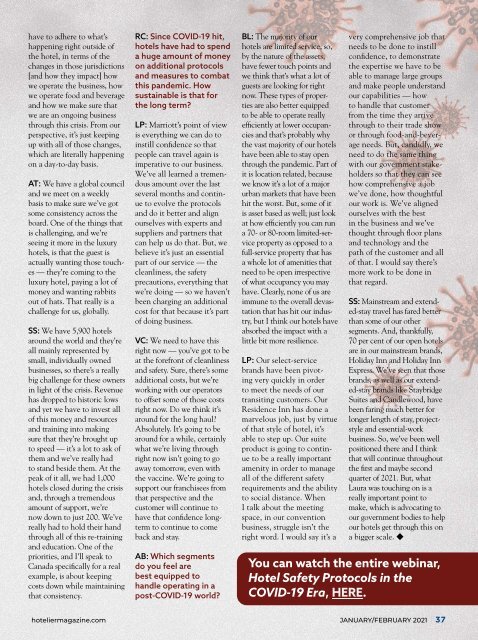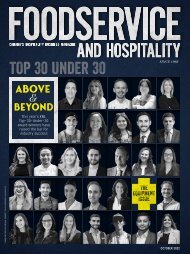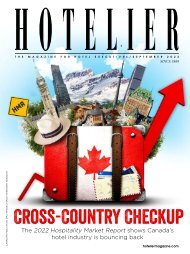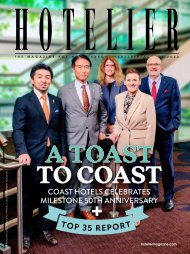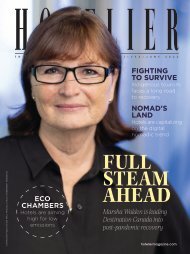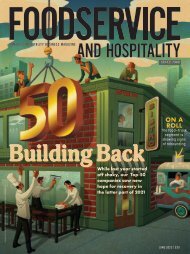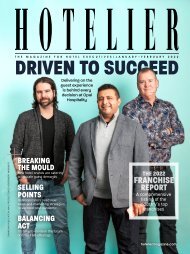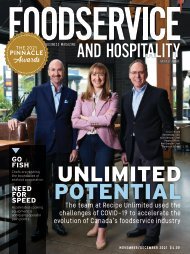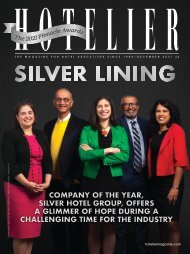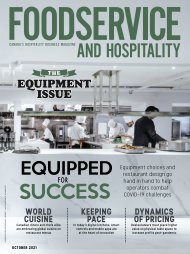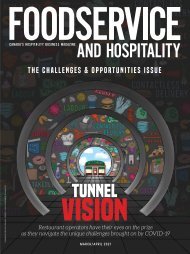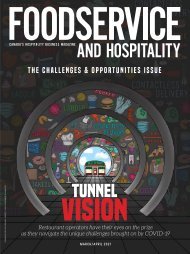January/February 2021
issue.
issue.
You also want an ePaper? Increase the reach of your titles
YUMPU automatically turns print PDFs into web optimized ePapers that Google loves.
have to adhere to what’s<br />
happening right outside of<br />
the hotel, in terms of the<br />
changes in those jurisdictions<br />
[and how they impact] how<br />
we operate the business, how<br />
we operate food and beverage<br />
and how we make sure that<br />
we are an ongoing business<br />
through this crisis. From our<br />
perspective, it’s just keeping<br />
up with all of those changes,<br />
which are literally happening<br />
on a day-to-day basis.<br />
AT: We have a global council<br />
and we meet on a weekly<br />
basis to make sure we’ve got<br />
some consistency across the<br />
board. One of the things that<br />
is challenging, and we’re<br />
seeing it more in the luxury<br />
hotels, is that the guest is<br />
actually wanting those touches<br />
— they’re coming to the<br />
luxury hotel, paying a lot of<br />
money and wanting rabbits<br />
out of hats. That really is a<br />
challenge for us, globally.<br />
SS: We have 5,900 hotels<br />
around the world and they’re<br />
all mainly represented by<br />
small, individually owned<br />
businesses, so there’s a really<br />
big challenge for these owners<br />
in light of the crisis. Revenue<br />
has dropped to historic lows<br />
and yet we have to invest all<br />
of this money and resources<br />
and training into making<br />
sure that they’re brought up<br />
to speed — it’s a lot to ask of<br />
them and we’ve really had<br />
to stand beside them. At the<br />
peak of it all, we had 1,000<br />
hotels closed during the crisis<br />
and, through a tremendous<br />
amount of support, we’re<br />
now down to just 200. We’ve<br />
really had to hold their hand<br />
through all of this re-training<br />
and education. One of the<br />
priorities, and I’ll speak to<br />
Canada specifically for a real<br />
example, is about keeping<br />
costs down while maintaining<br />
that consistency.<br />
RC: Since COVID-19 hit,<br />
hotels have had to spend<br />
a huge amount of money<br />
on additional protocols<br />
and measures to combat<br />
this pandemic. How<br />
sustainable is that for<br />
the long term?<br />
LP: Marriott’s point of view<br />
is everything we can do to<br />
instill confi dence so that<br />
people can travel again is<br />
imperative to our business.<br />
We’ve all learned a tremendous<br />
amount over the last<br />
several months and continue<br />
to evolve the protocols<br />
and do it better and align<br />
ourselves with experts and<br />
suppliers and partners that<br />
can help us do that. But, we<br />
believe it’s just an essential<br />
part of our service — the<br />
cleanliness, the safety<br />
precautions, everything that<br />
we’re doing — so we haven’t<br />
been charging an additional<br />
cost for that because it’s part<br />
of doing business.<br />
VC: We need to have this<br />
right now — you’ve got to be<br />
at the forefront of cleanliness<br />
and safety. Sure, there’s some<br />
additional costs, but we’re<br />
working with our operators<br />
to offset some of those costs<br />
right now. Do we think it’s<br />
around for the long haul?<br />
Absolutely. It’s going to be<br />
around for a while, certainly<br />
what we’re living through<br />
right now isn’t going to go<br />
away tomorrow, even with<br />
the vaccine. We’re going to<br />
support our franchisees from<br />
that perspective and the<br />
customer will continue to<br />
have that confidence longterm<br />
to continue to come<br />
back and stay.<br />
AB: Which segments<br />
do you feel are<br />
best equipped to<br />
handle operating in a<br />
post-COVID-19 world?<br />
BL: The majority of our<br />
hotels are limited service, so,<br />
by the nature of the assets,<br />
have fewer touch points and<br />
we think that’s what a lot of<br />
guests are looking for right<br />
now. These types of properties<br />
are also better equipped<br />
to be able to operate really<br />
efficiently at lower occupancies<br />
and that’s probably why<br />
the vast majority of our hotels<br />
have been able to stay open<br />
through the pandemic. Part of<br />
it is location related, because<br />
we know it’s a lot of a major<br />
urban markets that have been<br />
hit the worst. But, some of it<br />
is asset based as well; just look<br />
at how efficiently you can run<br />
a 70- or 80-room limited-service<br />
property as opposed to a<br />
full-service property that has<br />
a whole lot of amenities that<br />
need to be open irrespective<br />
of what occupancy you may<br />
have. Clearly, none of us are<br />
immune to the overall devastation<br />
that has hit our industry,<br />
but I think our hotels have<br />
absorbed the impact with a<br />
little bit more resilience.<br />
LP: Our select-service<br />
brands have been pivoting<br />
very quickly in order<br />
to meet the needs of our<br />
transiting customers. Our<br />
Residence Inn has done a<br />
marvelous job, just by virtue<br />
of that style of hotel, it’s<br />
able to step up. Our suite<br />
product is going to continue<br />
to be a really important<br />
amenity in order to manage<br />
all of the different safety<br />
requirements and the ability<br />
to social distance. When<br />
I talk about the meeting<br />
space, in our convention<br />
business, struggle isn’t the<br />
right word. I would say it’s a<br />
very comprehensive job that<br />
needs to be done to instill<br />
confi dence, to demonstrate<br />
the expertise we have to be<br />
able to manage large groups<br />
and make people understand<br />
our capabilities — how<br />
to handle that customer<br />
from the time they arrive<br />
through to their trade show<br />
or through food-and-beverage<br />
needs. But, candidly, we<br />
need to do the same thing<br />
with our government stakeholders<br />
so that they can see<br />
how comprehensive a job<br />
we’ve done, how thoughtful<br />
our work is. We’ve aligned<br />
ourselves with the best<br />
in the business and we’ve<br />
thought through fl oor plans<br />
and technology and the<br />
path of the customer and all<br />
of that. I would say there’s<br />
more work to be done in<br />
that regard.<br />
SS: Mainstream and extended-stay<br />
travel has fared better<br />
than some of our other<br />
segments. And, thankfully,<br />
70 per cent of our open hotels<br />
are in our mainstream brands,<br />
Holiday Inn and Holiday Inn<br />
Express. We’ve seen that those<br />
brands, as well as our extended-stay<br />
brands like Staybridge<br />
Suites and Candlewood, have<br />
been faring much better for<br />
longer length of stay, projectstyle<br />
and essential-work<br />
business. So, we’ve been well<br />
positioned there and I think<br />
that will continue throughout<br />
the first and maybe second<br />
quarter of <strong>2021</strong>. But, what<br />
Laura was touching on is a<br />
really important point to<br />
make, which is advocating to<br />
our government bodies to help<br />
our hotels get through this on<br />
a bigger scale. ◆<br />
You can watch the entire webinar,<br />
Hotel Safety Protocols in the<br />
COVID-19 Era, HERE.<br />
hoteliermagazine.com JANUARY/FEBRUARY <strong>2021</strong> | 37


